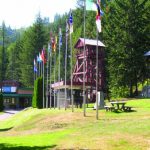LETTER: Applauding the school board's actions
Dear Editor;
There has been much anger aimed at the board of School District 20 over the passing of the motion to postpone the Planning for the Future public consultation meetings that were scheduled to take place in January.
Our understanding is that at the next meeting of the board, probably in January, the board will work out a new schedule of public meetings, which will include discussion of the Ministry of Education’s initiatives for Neighbourhood Learning Centres and 21st Century Education, and how our communities can incorporate these new ideas. Several board members emphasized over and over that they wish to foster a positive dialogue among district communities. This is an important board decision and signals the opportunity for everyone to step back and rebuild the relationships that will be necessary maintaining excellence in education in the district. It is critical to broaden the discussion to examine options other than closing valued schools.
School District 20 has already closed nine schools — a larger percentage of schools in the last ten years than any district in the entire province — but is only the 15th fastest declining district with respect to enrolment. Districts such as Boundary, Revelstoke, Sunshine Coast, Prince Rupert, Qualicum and Arrow Lakes are all declining in enrolment faster than our district. Boundary, Sunshine Coast and Qualicum have closed no schools in the last 10 years. Revelstoke and Arrow Lakes have closed one each. Prince Rupert has closed three.
The Vancouver School Board has decided to close no schools until at least 2012, even though they have schools with capacities as low as 30 and 40 per cent and have only closed one school in ten years, because they believe that schools represent the “heart of the community and soul of the neighbourhood.” Their moratorium on closing schools is designed to give all parties, including the public, time to map out additional, more comprehensive uses of schools within their immediate neighbourhoods.
Our district, on the other hand, has almost normalized the concept of school closures. People seem to think that this is what every district across the province is doing, and that we have no other choice. This is just not the case. We’re not saying that no schools should ever be closed — that’s unrealistic — but there are more positive ways to deal with budgetary issues. If closures are the solution we always look to, and we close Rossland Secondary, Castlegar Primary and Blueberry Creek, then what’s next? What happens in three or five years when things get tight again?
Recently, three members of the Neighbourhoods of Learning committee in Rossland travelled to Grand Forks and met with past superintendent of SD 51 Boundary, Denny Kemprud, current superintendent Michael Strukoff and board chair Theresa Rezansoff. We were very impressed with the vision of the Boundary district staff and trustees. Their district starts with the commitment of keeping schools open and goes on to find the best way to make use of those schools. As enrollment drops and space opens up, that space is made available for “family centres” and non-profit groups. By keeping the schools open, they create more space for family-oriented programs, which support the community. They partner with IHA (public and mental health), the Ministry of Children & Family Development, Boundary Family & Individual Services Society and a couple of others, and work collaboratively with them with respect to students’ needs, etc. In essence, they have been using all their schools for Neighbourhoods of Learning-type programs for several years.
SD51 has closed no schools in the last ten years even though their enrolment is declining faster than SD20’s, and they are not enjoying the increase in elementary enrolment that our district is. Their trustees and staff have been doing everything they can to avoid closing the Beaverdell school, which has eight students! They may have to face a closure or two eventually, but they are working hard to prevent that, with very positive results.
Rosslanders understand that the status quo is not sustainable over the long term, and are working towards solutions by planning for a Neighbourhoods of Learning centre in one of our schools. Neighbourhoods of Learning is a ministry iniative promoting the use of underused school facilities for community programs and users. The ministry is not allowing school boards to sell the closed buildings without special permission, as they have projected that enrollments will be increasing in the next ten years, and know they will need some of these facilities in the future.
Closing schools may be the most obvious and simplistic solution to SD20’s budgetary issues, but we need to applaud the board’s choice to try to move the dialogue in a more creative and collaborative direction. We must encourage SD20 to form Neighbourhoods of Learning centres throughout the district by listening to communities and parents, and forming relationships with other organizations and groups in order to build community partnerships. With commitment from all parties, we can generate enormous benefits to our children, our schools, our communities, and to the district’s bottom line.
— Rossland Neighbourhoods of Learning Committee




















